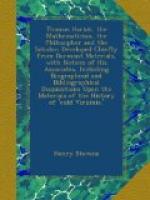Raleigh’s patent, in which all interests were thus consolidated, came before Parliament in the Autumn of 1584 well fortified in its historical and geographical bearings by Hakluyt’s learned Discourse. In the House of Commons the matter was adroitly referred to a Commitee of which Walsingham and Sir Philip Sidney, Sir Christopher Hatton and Sir Francis Drake were members. The bill having passed the House was sent up to the Lords, and there read the first time on Sunday the 19th of December 1584, as appears by the following entry in the Lords’ Journal, volume ii, page 76. ’ Hodie allatae sicut a Dome Communi 4 Billae; Prima, For the Confirmation of the Queen’s Majesty’s Letters Patents, granted to Walter Raughlieghe, Esquire, touching the Discovery and Inhabiting of certain Foreign Lands and Countries, quae ia vice lecta est.’ It does not appear precisely at what date the Bill received the Queen’s signature, but probably as early as Christmas or New Year.
Having now early in 1585 secured the Confirmation of this much coveted patent which liberally permitted him in the name and under the aegis of England to plant a ’ colonie’ and found an English empire in the New World at his own expense of money, men, and enterprise; having pocketed the geographical results and valuable experience of the French in Florida and Canada; having vainly attempted a visit to Newfoundland in 1578, and having succeeded to the rights and privileges of his noble half-brother Sir Humphrey Gilbert; having received by the return in September of his two reconnoitring barks favorable reports as to the properest place to begin his Western Planting in Wingandacoa ; and being thoroughly supported by the good wishes and hearty co-operation of the Queen and many of her prominent and influential subjects, Raleigh rose superior to all jealousies and opposition.
This lasted as usual just so long as he was successful and no longer. But he was blessed in his household, or at his table, or in his confidence, with four sterling adherents who stuck to him through thick and thin, through prosperity and adversity. These were Richard Hakluyt, Jaques Le Moyne, John White and Thomas Hariot. When Wingandacoa makes up her jewels she will not forget these Four, whom it is just to call Raleigh’s Magi.
With marvellous energy, enterprise, and skill Raleigh collected and fitted out in an incredibly short time a fleet of seven ships well stocked and well manned to transport his ’ first colonie ’ into the wilds of America. It was under the command of his valiant cousin, Admiral Sir Richard Grenville, and sailed from Plymouth on the 19th of May 1585. Never before did a finer fleet leave the shores of England, and never since was one more honestly or hopefully dispatched. There were the ’ Tyger’ and the ’ Roe Buck’ of 140 tons each, the ’ Lyon’ of 100 tons, the ‘Elizabeth’ of 50 tons, the ’ Dorothea,” a small bark, and two pinnaces, hardly big enough




